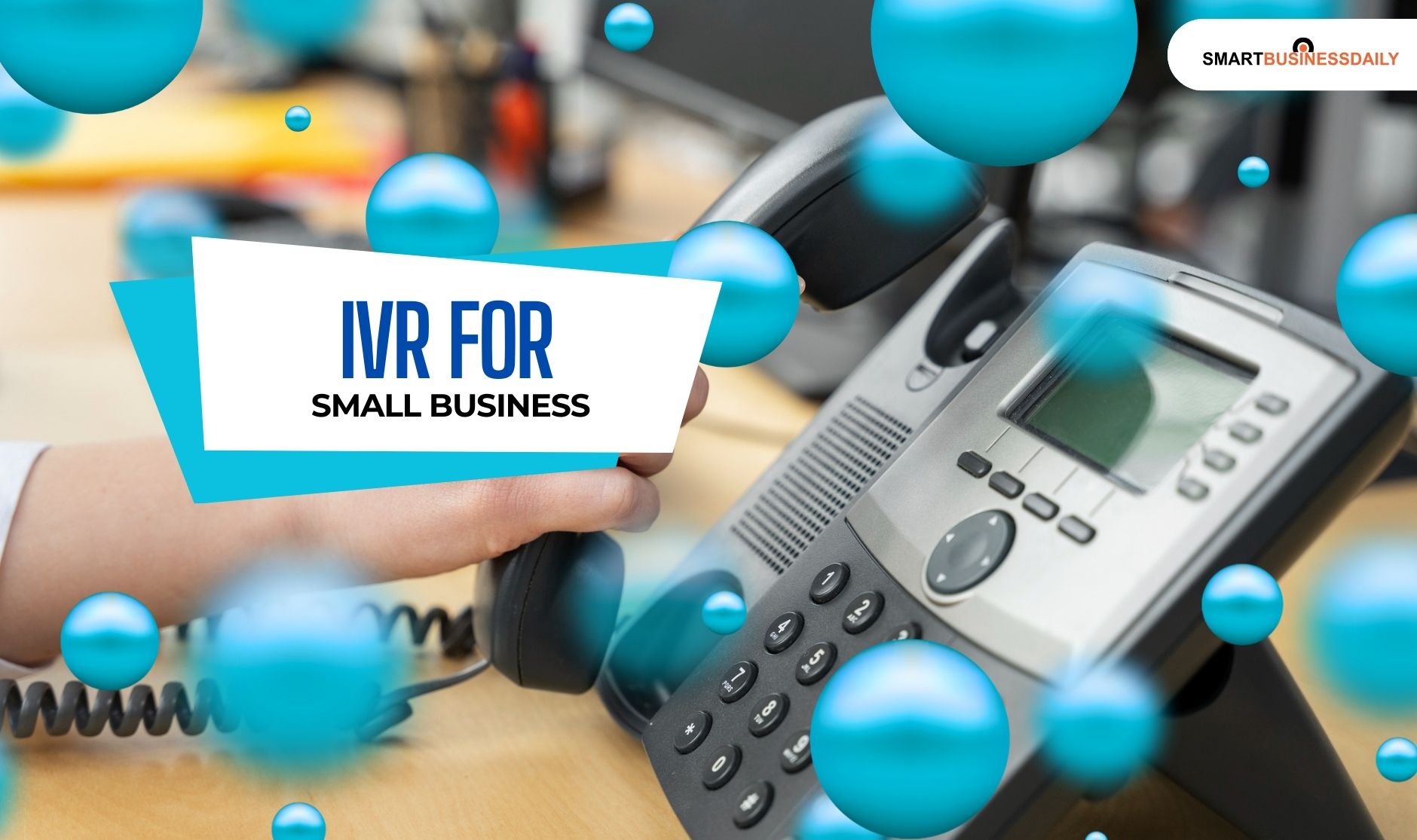How Does IVR Work For Small Businesses? A Comprehensive Guide
13 September 2025
5 Mins Read

- What Is An IVR System? And How Does It Benefit Businesses?
- How Does IVR Help Businesses Grow?
- 1. Simplify 24/7 Customer Support
- 2. Customized Greetings and Strong Brand Presence
- 3. Increase Team Productivity Automatically
- 4. Easily Support Large Call Volumes
- 5. Smooth Transition from Caller to Loyal Customer
- 6. Use IVR as a Marketing Tool
- What Are The Main Features Of IVR For Small Businesses?
- 1. Real-Time Call Dashboard
- 2. Automatic Call Recording
- 3. Smooth CRM Integration
- 4. Remote Work Support Teams
- 5. Intuitive IVR Menu
- 6. Integrated Call Reports and Analytics
- How Much Does IVR Cost?
- How To Determine The IVR Costs?
- Wrapping It Up!
Managing a small business implies managing several things simultaneously—sales, customer operations, advertising, and even HR in some cases.
Amidst everything, something that easily gets on the back burner is customer service. It, however, is the foundation of growth.
Customers demand instant responses, and they won’t wait for them; they will go to the next guy.
This is where IVR (Interactive Voice Response) comes to your rescue. You can:
- Manage calls in a better way,
- Route customers to the correct person in no time, and
- Make your business appear professional without having to maintain a huge staff.
Customer service today is not only about receiving calls—it is about delivering an omnichannel experience.
Today’s contact center solutions demonstrate how those in business are taking calls, emails, and chats from a single location. And at the very core of it, IVR is a key in making communication easy.
So let’s get started and learn what IVR is, what it does, and why small businesses care so much.
What Is An IVR System? And How Does It Benefit Businesses?
IVR stands for Interactive Voice Response, a computerized IV system that enables a caller to communicate with a pre-recorded menu through phone keypad or voice.
Chances are you’ve witnessed it in action when you call a company and are prompted, “Press 1 for sales, Press 2 for support…”
It’s elegant and efficient. Rather than having staff transfer calls manually, IVR transfers them to the correct department or person automatically. For small businesses, it means:
- No more missed calls.
- Less frustration for customers.
- A professional first impression.
In short, IVR for Small Business ensures every call is handled properly, giving customers a smooth experience while saving time for the business.
How Does IVR Help Businesses Grow?
Now, let’s explore how IVR actually helps businesses grow and function better.
1. Simplify 24/7 Customer Support
Customers don’t just call during business hours. Thanks to IVR, you can set up automated menus to share basic information or record customer requests even when your team is offline. This means your business looks active and reachable 24/7.
2. Customized Greetings and Strong Brand Presence
Your customers receive a warm, professional greeting the minute they call. Personalized IVR menus let you integrate branded messages.
This way, your small business looks established and legitimate. It’s as though you have a virtual receptionist who reflects your brand voice.
3. Increase Team Productivity Automatically
Employees waste too much time routing a call or answering a question outside of their responsibilities. However, IVR helps to change this game and increase the maximum productivity.
Using IVR for Small Business, calls go directly to the right person, so your employees can focus on their primary responsibilities. The result? Less stress, increased efficiency.
4. Easily Support Large Call Volumes
As call traffic increases, IVR does not leave any party behind. It can serve many calls simultaneously, navigate customers through menus, and save time on waiting.
That’s a huge plus for businesses seeking to remain customer-focused in peak times.
5. Smooth Transition from Caller to Loyal Customer
Good service on the phone does not readily transform a caller into a repeat consumer. IVR achieves the same through not having callers repeat themselves to different agents. From the first “hello,” callers are made to feel well taken care of.
6. Use IVR as a Marketing Tool
IVR is not just for call transfers. You can use it to promote offers, release updates, or push out new services within your greetings.
It’s a low-cost, easy way to promote directly to your customers when they are already engaging with your business.
What Are The Main Features Of IVR For Small Businesses?
A high-performance IVR system incorporates features that facilitate seamless and intelligent interaction with customers.
Some of the most useful are described in detail below:
1. Real-Time Call Dashboard
A real-time panel gives you a way to see who’s calling, what’s currently ringing, and what your people are working on at a glance. It’s a bird’s-eye view of your service in progress.
2. Automatic Call Recording
All the calls are recorded and retained for future reference. It allows training employees, resolving disputes, and having a clear record of what was negotiated with customers.
3. Smooth CRM Integration
Combine IVR with your CRM to make customer data and call history instantly available. Agents are then in a stronger position to provide tailored direction and track customer journeys more readily.
4. Remote Work Support Teams
With a virtual IVR system, staff can answer from anywhere. That’s even in the event your staff are working remotely. Customers then enjoy a smooth experience.
5. Intuitive IVR Menu
Menus are short and intuitive. A good IVR system lets you customize greetings and keep things simple so your customers are not stuck in complex, time-wasting menus.
6. Integrated Call Reports and Analytics
Reports help you view call patterns. It can be about the
- Busiest times,
- Calls not taken,
- Average handling time, and much more.
You can then direct refinements in your customer service and in staff handling, based on reports.
How Much Does IVR Cost?
In general, the overall cost of IVR may vary in the US and other regions. But, on average, it ranged from $25 to $100 per month for the cloud-based solutions.
The cost of IVR for small businesses can go upto hundreds and thousands of dollars per month, if you are opting for more complex or enterprise plans.
Moreover, the overall costs can add up additional numbers based on the call volume, features, a nd agent seats.
How To Determine The IVR Costs?
First things first, you have to assess your needs. You must try to determine the complexity of your desired call flow, along with the features that you need.
Secondly, you have to evaluate the call volume. Try to understand the number of incoming calls your small business is going to deal with on a daily or monthly basis.
Thirdly, you have to consider yout budget. Here, you can decide on a monthly or annual budget for the IVR for small businesses.
Lastly, if you think your business is going to deal with larger call volumes or much more complex needs, then you should contact the providers directly. They can help you get a custom quote.
Wrapping It Up!
Customer service is not a choice! It’s a necessity. As a small business, every single customer is important, and you can’t afford to lose a single one over bad service. That’s why IVR for small businesses is a must-have tool.
With IVR for Small Business, you are able to:
- Save money and time.
- Improve customer satisfaction.
- Handle calls professionally.
- Scale your business without scaling your team.
And when you put IVR in an omnichannel solution, you have a far stronger resource, enabling you to manage calls, chats, and emails from a single place.
At the end of the day, IVR is not about routing calls. It is about establishing smooth, consistent, and professional customer interactions that make small businesses bigger.
Read Also:



















Comments Are Closed For This Article